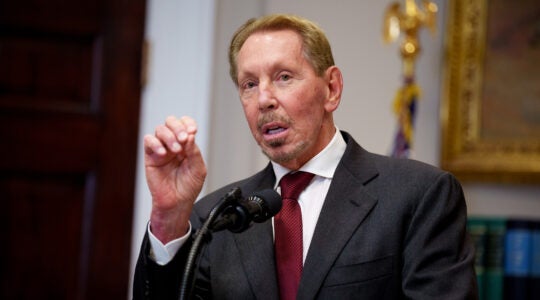Jewish organizational leaders expressed qualified praise for Mitt Romney’s speech on his faith.
The former Massachusetts governor, whose Mormon faith has prompted resistance during his bid for the Republican Party’s presidential nomination, delivered a major speech on how his Mormonism informs his life. Romney said his specific faith would have no bearing on how he governs, but added that he believes that American public life acknowledges a “creator.”
“We should acknowledge the Creator as did the founders – in ceremony and word,” Romney said in a speech delivered Thursday at the George Bush Presidential Library in College Park, Texas. “He should remain on our currency, in our pledge, in the teaching of our history, and during the holiday season, nativity scenes and menorahs should be welcome in our public places. Our greatness would not long endure without judges who respect the foundation of faith upon which our constitution rests. I will take care to separate the affairs of government from any religion, but I will not separate us from ‘the God who gave us liberty.'”
Abraham Foxman, the Anti-Defamation League’s national director, welcomed the speech but said he regretted that Romney felt compelled to deliver it.
“We agree that there is no place in our society for bigotry, and that one’s religion should never be a test for political office,” he said in a statement. “We are deeply concerned, however, that it has become part of our political culture for candidates to be forced into asserting their religiosity, with some even openly hawking their faith on the campaign trial.”
Rabbi David Saperstein, who directs the Reform movement’s Religious Action Center, praised Romney’s rejection of a religious standard for office as “a primer for electoral candidates to study in getting the use of religion in our elections right.”
However, Saperstein said, he was troubled by an inherent contradiction in the speech: Romney affirmed that he believes Jesus is the son of God.
“If it were wrong to explain his Mormonism because candidates should not talk about their religion, then it was wrong to offer this assertion of faith, which served little purpose other than as a political ploy: to reassure observant Catholics and Protestants – most of all conservative Evangelical Protestants – that he shared their core belief,” Saperstein wrote on his blog.
JTA has documented Jewish history in real-time for over a century. Keep our journalism strong by joining us in supporting independent, award-winning reporting.





